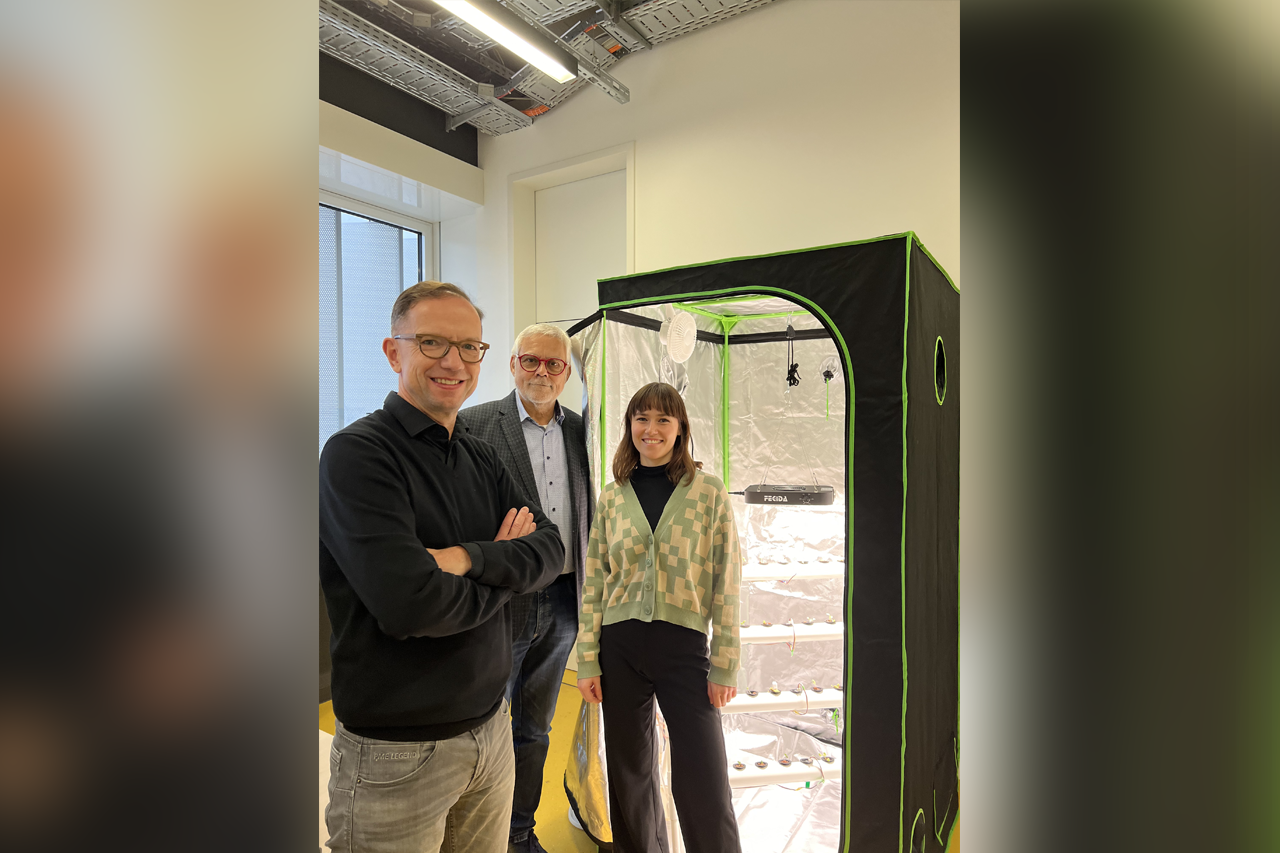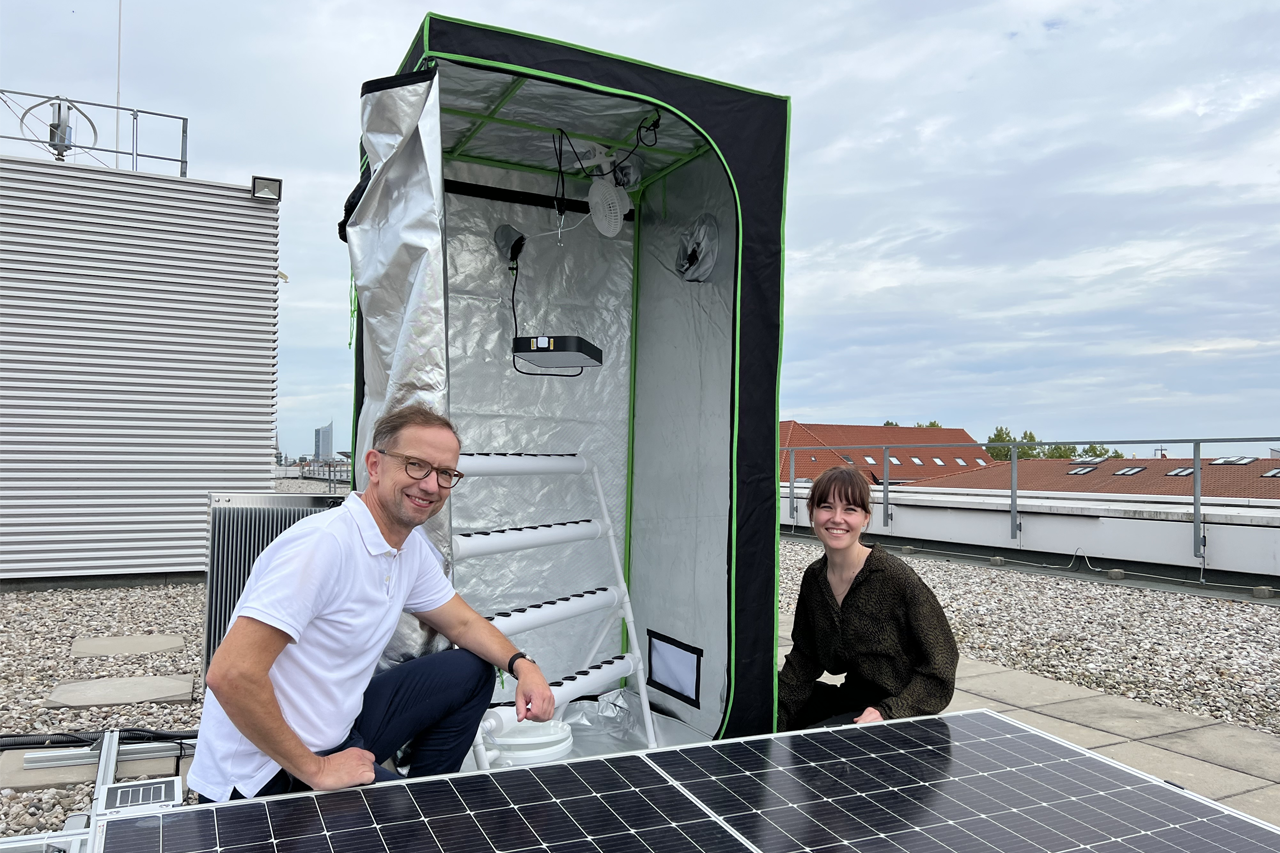Engineering team researches combination of solar power and hydroponic plant growth in a grow box.
In their research project OptiPlant, Prof Mathias Rudolph (Chair of Industrial Metrology, Faculty ING HTWK Leipzig) and B. Eng. Lena Strobl have connected a grow box with a mini photovoltaic system, similar in size and performance to mini PV systems, such as those already used in many households today in so-called balcony power plants.
Balcony power stations are system solutions for generating energy on the balcony at home. They consist of one or two photovoltaic modules, an inverter and a connection cable to the socket. To date, legislation in Germany has permitted such mini power plants up to an inverter output of 600 watts; from January 2024, these systems will be permitted in Germany up to 800 watts.
Mini PV systems can not only reduce electricity costs by up to 20 per cent. In times of climate change, such mini PV systems can be used specifically in urban gardening to enable sustainable cultivation and environmentally friendly production of agricultural products in urban regions.
Urban gardening, i.e. the sustainable cultivation of horticultural crops and home-grown fruit, vegetables or herbs, will become increasingly important in the future. Due to extreme weather conditions such as droughts or floods, agricultural land is being lost in certain regions in the short and long term. In addition, the consequences of climate change and regional wars are increasingly causing people to flee to safe, urban regions. Smart urban gardening has therefore also become increasingly important in the fight against poverty in recent years.
In its research project, the OptiPlant team has spent the last few months investigating how emission-free solar energy can be used smartly in urban gardening using a grow box and presented it to its sponsor, the Elstatik Foundation, in December 2023.
Crops such as vegetables and herbs can be grown on balconies, patios or in allotments. This form of urban gardening is usually associated with higher water consumption and requires soil. However, as space is becoming increasingly limited in many cities, balconies and growing areas such as traditional allotments are not available everywhere and water shortages are becoming the norm, alternative systems often have to be used - such as a grow box.
This is a compact, mostly closed cultivation system and creates an optimal climate for plant growth in the smallest of spaces. The box can be installed anywhere: on balconies, roofs, terraces or in dark indoor spaces. For the research project, plants were cultivated using a hydroponic system which, in contrast to conventional soil cultivation, uses water as a medium to supply the plants with nutrients. The hydroponic system enables faster and more efficient growth without the need for soil.
In the research project, the combination of solar power as generated in domestic balcony power plants and the growth of plants in a grow box was investigated from summer 2022 to the end of 2023. A simulation programme calculated specific daily hydrographs depending on the location and for each balcony orientation. The energy consumption of the grow box was recorded using an energy meter and compared with the calculated energy produced by the balcony power plant. It was shown that the electrical supply of the nutrient film technology system (NFT system), as well as all other components of the grow box, can also be guaranteed in the transition months by a balcony power station.
A test setup was set up in one of the HTWK's measurement technology laboratories to collect the data. Suitable sensors were used to monitor the hydroponic system and support plant growth with LEDs.

In December 2023, Prof Rudolph and Lena Strobl presented their project results to the sponsor Wolfang Schubert from the Elstatik Foundation. In addition to "Optiplant", the foundation also funded the previous projects "Solar Web Optimisation", "Energy Harvesting in Practical Application" and "Switch-based Optimisation of Photovoltaic Systems".
With OptiPlant, the research team is making a scientifically sound contribution to sustainable and energy-efficient crop cultivation in urban environments.
